LUXURY ESCAPE
Slowboating: Float away from this crazy world
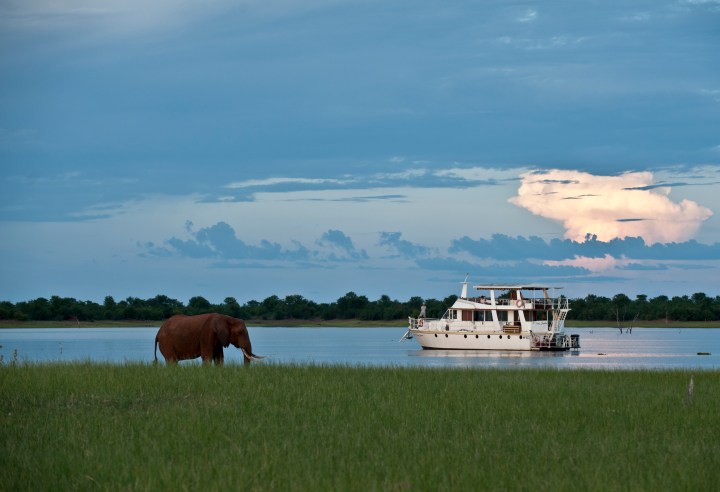
Kariba is the world’s second-largest dam in a valley full of wild animals and underwater tigers. The best way to experience it is on a houseboat.
The night was so still the plop of a fish snatching an insect from the surface shocked the silence. Out on the lake, the lights of kapenta rigs glowed like a string of pearls and the glassy water around us reflected the curve of the Milky Way. Lying on deck, I held off sleep watching satellites and meteors stitching a star tapestry.
In the hour before dawn, it was still calm and the bay in which Lady Jacqueline had anchored seemed to be holding its breath. Then a tear of light separated the mopane-ridged hill from the sky and leaked opal across the water. The glow gradually yellowed to old gold, painting soft pink a scattering of clouds in the west.
I became aware of a sound — soft white noise. A breeze shifted my mosquito net and the hiss revealed itself as small ripples lapping the side of the boat. Guineafowl chatter alerted a fish eagle, who woke a green spotted dove and night was relegated to memory. Our personal chef, Chauya Simatu, arrived with coffee and rusks.
“Good time to catch bream,” he said as he headed back down below. “I’ve got a worm farm on the aft deck. Bream love worms.”
We were on day two of a six-day cruise from Binga, at the western end of Zimbabwe’s Lake Kariba, to the wall somewhere out east and still too far away to think about.
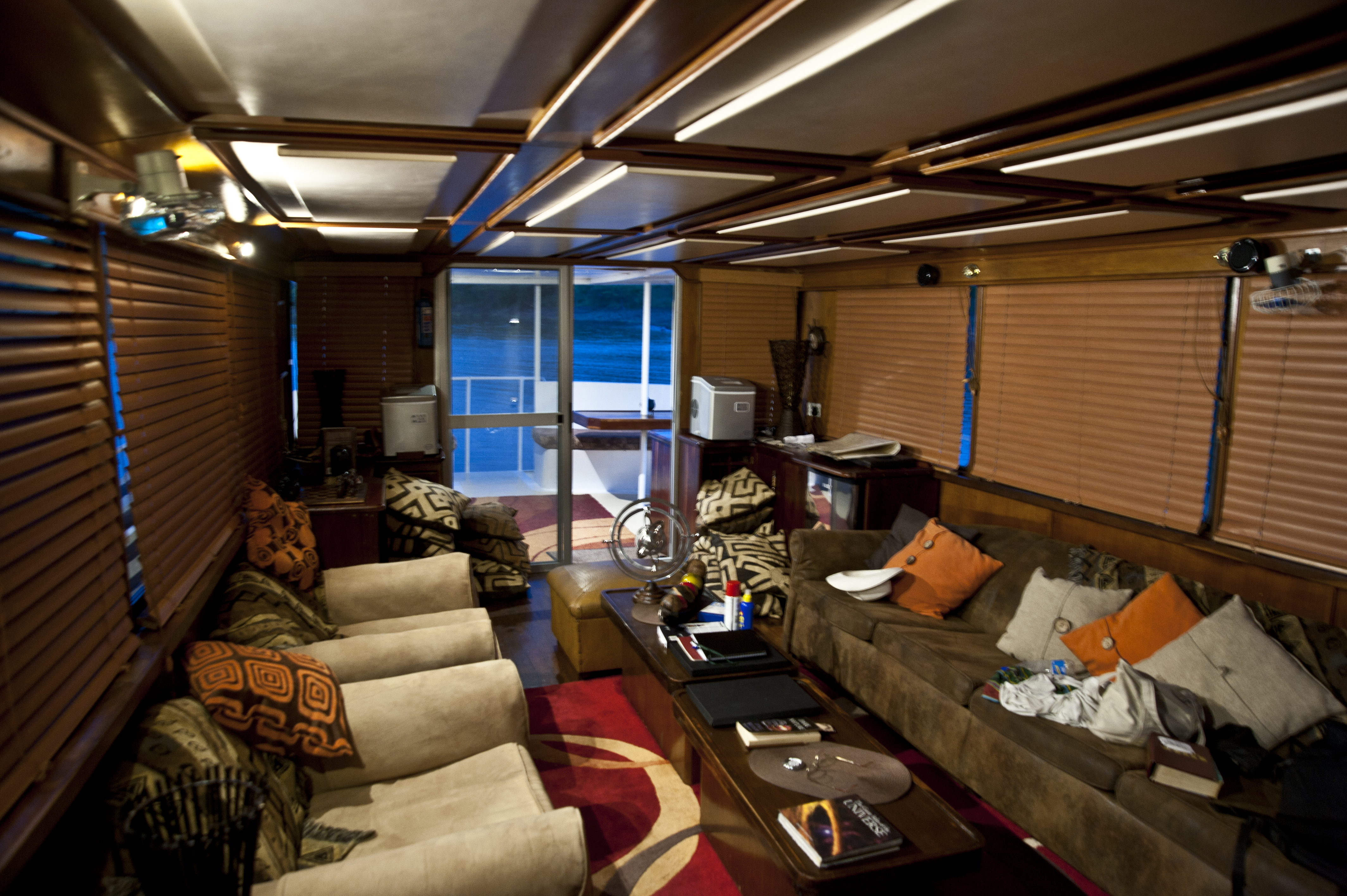
There’s no shortage of luxury on the Lady Jacqueline. Image: Don Pinnock
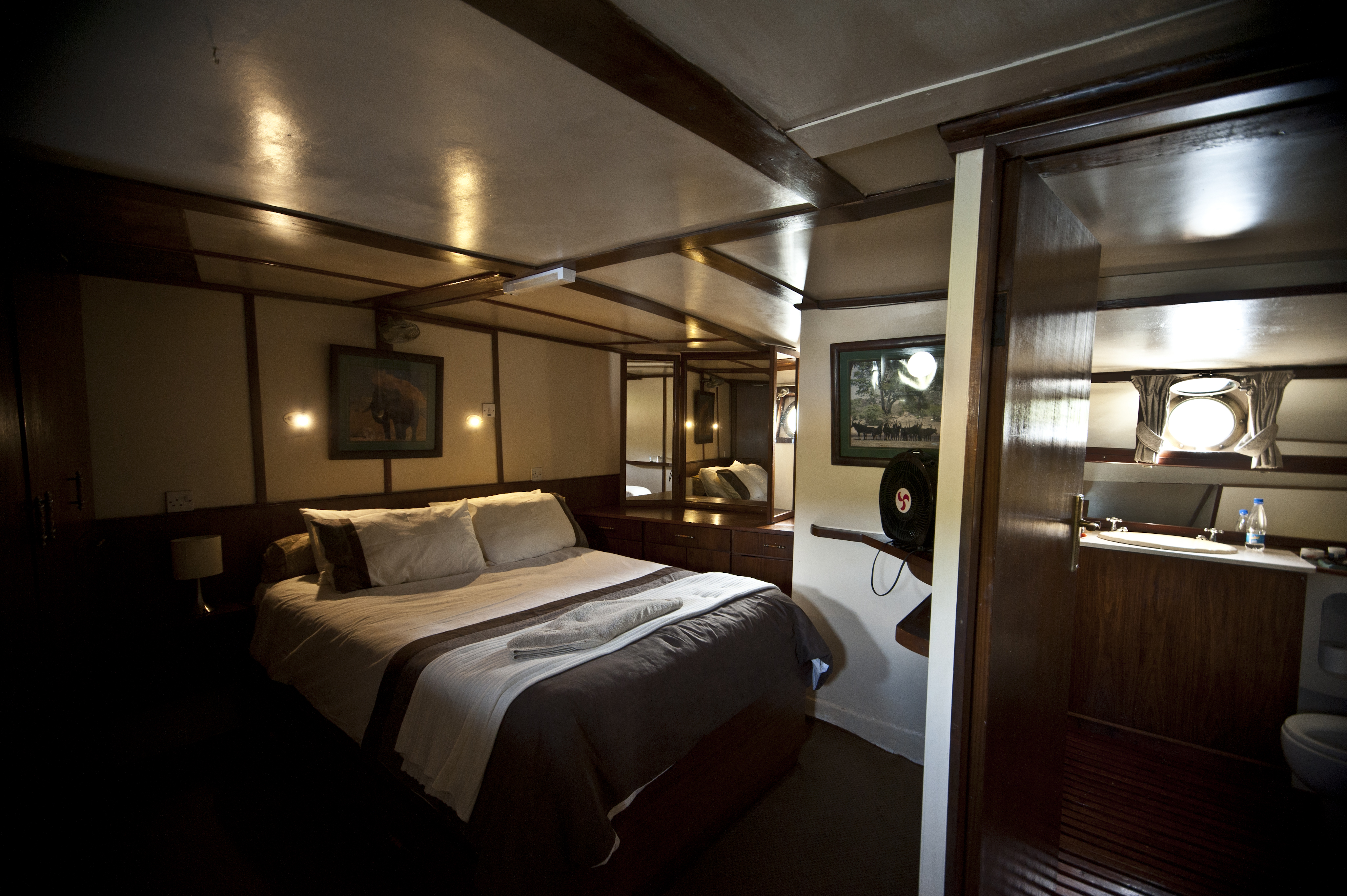
Lady J’s master cabin. Image: Don Pinnock
Kariba isn’t really a lake but the world’s second-largest dam (Aswan is the biggest) created by a relatively small wall across the Zambezi at the Kariba Gorge. It’s four times the size of the Three Gorges Dam in China. But at around 50 years old it’s a newcomer to being a lake. The shoreline hasn’t had much practice at being one and exhibits its surprise in wave-clawed hillsides, scree rockslides, and forests of now white, dead trees marching across its shallows.
The entire Zambezi Valley is an area of around 12,000 square kilometres and is some of the best wildlife country in Africa. It includes spectacular landscapes stretching from the Gorge to Victoria Falls and is home to an astonishing array of creatures. On hills and in valleys around the lake are large areas of mopane scrub and acacia woodland interspersed with ancient baobab trees. Woodlands of ana trees and Natal mahogany grow along the alluvial flood plains.
It’s a hilly country. As the lake filled, hilltops became islands, and tributaries filled into bays, leaving the shoreline, on a map, looking rather like the ripped victim of a massive grenade attack. The outcome, as the lake rose and fell, has been grass-covered shores and islets favoured by elephants, hippos, and crocs as well as countless bays for bream and tiger fish.
By the time I got to the lower deck, Chauya was at work with rod, worms, and bucket. Not bothering to cast, he was dropping the hook down the side of the boat and hauling out bream, pausing only to replace a worm. It had more in common with shopping than fishing, and the result, that evening was pan-fried bream fillets with potato wedges.
By 09h00 the lake was showing another face. The wind was moaning in the rigging and whipping up waves that dared us to put our bow out of the bay. A fish eagle hung motionless nearby, peering at the sharded surface, but appeared to see no fish worth dropping onto. The brass dinner bell clanged like a Cornish warning buoy until we bound its swinging clapper into silence.

With the boat to yourself you can stop where you like. Image: Don Pinnock
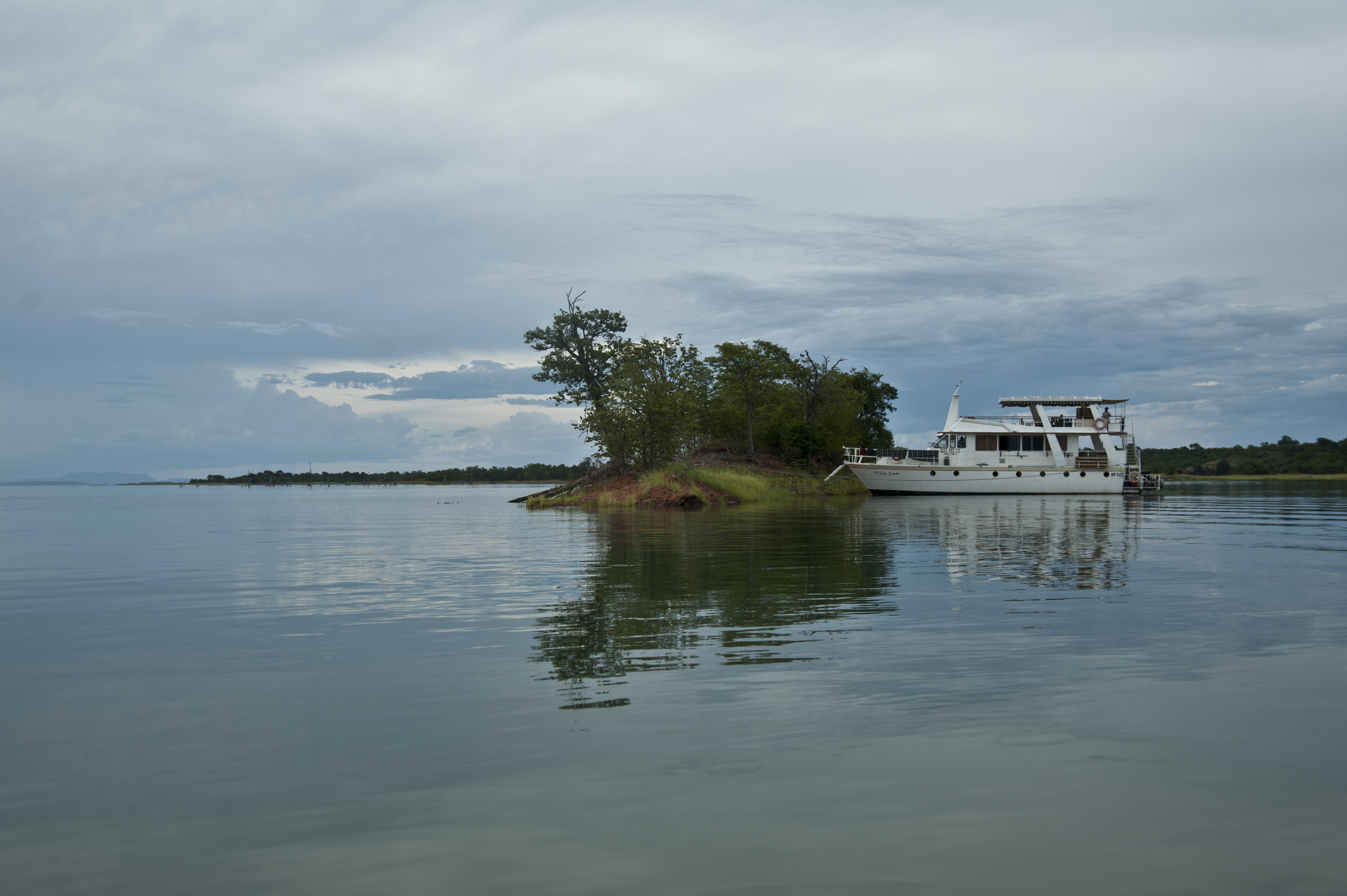
Pick your own island for a picnic. Image: Don Pinnock
At about midday, our captain, Life Siambilila, decided to make a run for Elephant Island. That certainly tested our sea legs. We eventually tied up well after sunset, picking our way through dead trees that looked like ghostly hands pointing up at a witchy black sky.
The wind died during the night and the next day we sailed to Chibuyu in perfect calm. There we stopped for tea with Bill and Trish Taylor who run a kapenta operation. The Lady J moored among their rigs — basically platforms on pontoons with a round net swung from a boom over the side. At night they lower the net and switch on bright lights, which attract plankton. The kapenta, small, sardine-like fish, follow this food supply and when the net’s raised it’s full of silver protein ready for the drying racks.

The lady of the lake. Image: Don Pinnock
The further east we sailed the more animals appeared along the shore until, at the Ume River, we were on the edge of Matusadona National Park and elephants were everywhere. It seemed a good place to launch a tiger hunt. We cast off the tender boat late afternoon and headed upstream on glassy, sky blue water. An elephant ripping up grass on the bank warned us off with an ear flapping display as we passed and hippos munched contentedly, ignoring us.
Our destination was Tiger Bay, named for being favoured by the lake’s legendary fighting fish. On the way, we trawled colourful lures with names like Black Fury and Super Vibrax but caught only weeds. The low sun was floodlighting purple thunderheads that flashed and rumbled in the east and became ever-changing abstract art in the ripples of the boat’s spreading wake.
In Tiger Bay, we threw more lures to tempt our prey but mostly got lost in the trance-inducing repetition of cast out and reel back. Being in such natural beauty seemed reward enough and catching a fish merely a distraction.
Suddenly my son’s rod bent and the reel hissed. The tiger was leaping and fighting its annoyingly resistant meal all around the boat. It hurled itself into the air, flashing its legendary black and gold stripes, then, just as suddenly it was gone. The rod flicked straight and Captain Life sighed. “Hard mouths,” he said, “you have to keep the line tight or you lose them.”
The light was fading fast so we left it at that and made our way back through the gathering darkness lit by flashes of sheet lightning and the welcoming glow of the Lady Jacqueline. Despite returning from the hunt empty-handed we didn’t miss out on fish for supper: Chauwya had been busy over the side with worms. There’s clearly a difference between sport and practicality.

Kapenta rigs on the way to night fishing. Image: Don Pinnock

Waiting for a tiger fish to take the lure. Image: Don Pinnock
Gordon’s Bay, our last stop, was a place of hippos and we had a chance to become acquainted. They’re giant, aubergine-shaped air-filled grass eaters and pretty grumpy as well. At night they emerged silently from the lake to munch the green swards beside the boat.
As dawn pinked the horizon they gently eased themselves back into the water with all manner of orchestration. The most prominent sound was their standard complaint — eep erferferf — but the most dramatic was a rip that exploded in bubbles and rumble from the other end. In between were the deep sounds of large stomachs working their way through a night of grass and emerging as spectacular booming burps, followed by satisfied sighs.
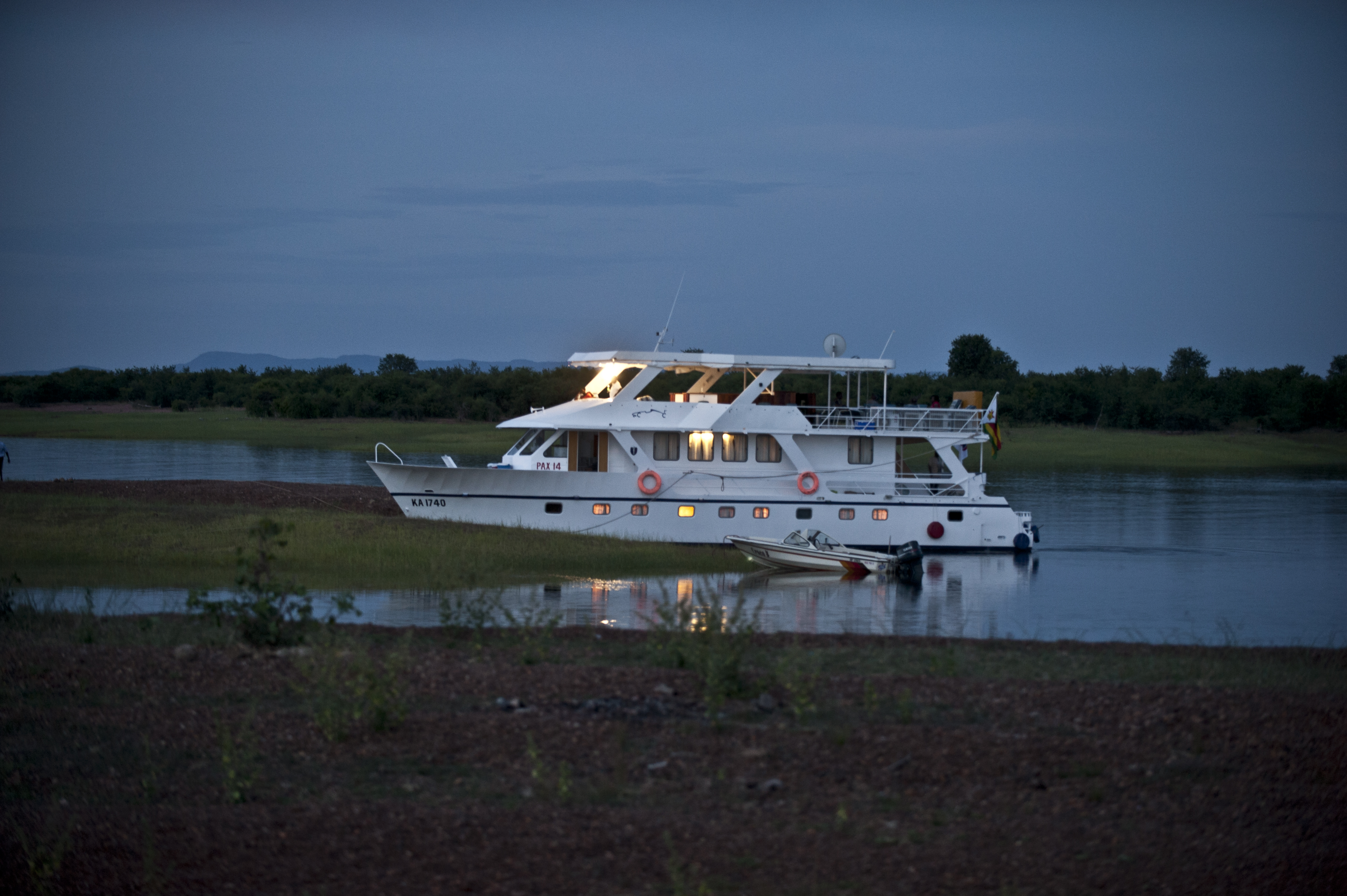
When evening falls you pick your own port along the endless shore. Image: Don Pinnock
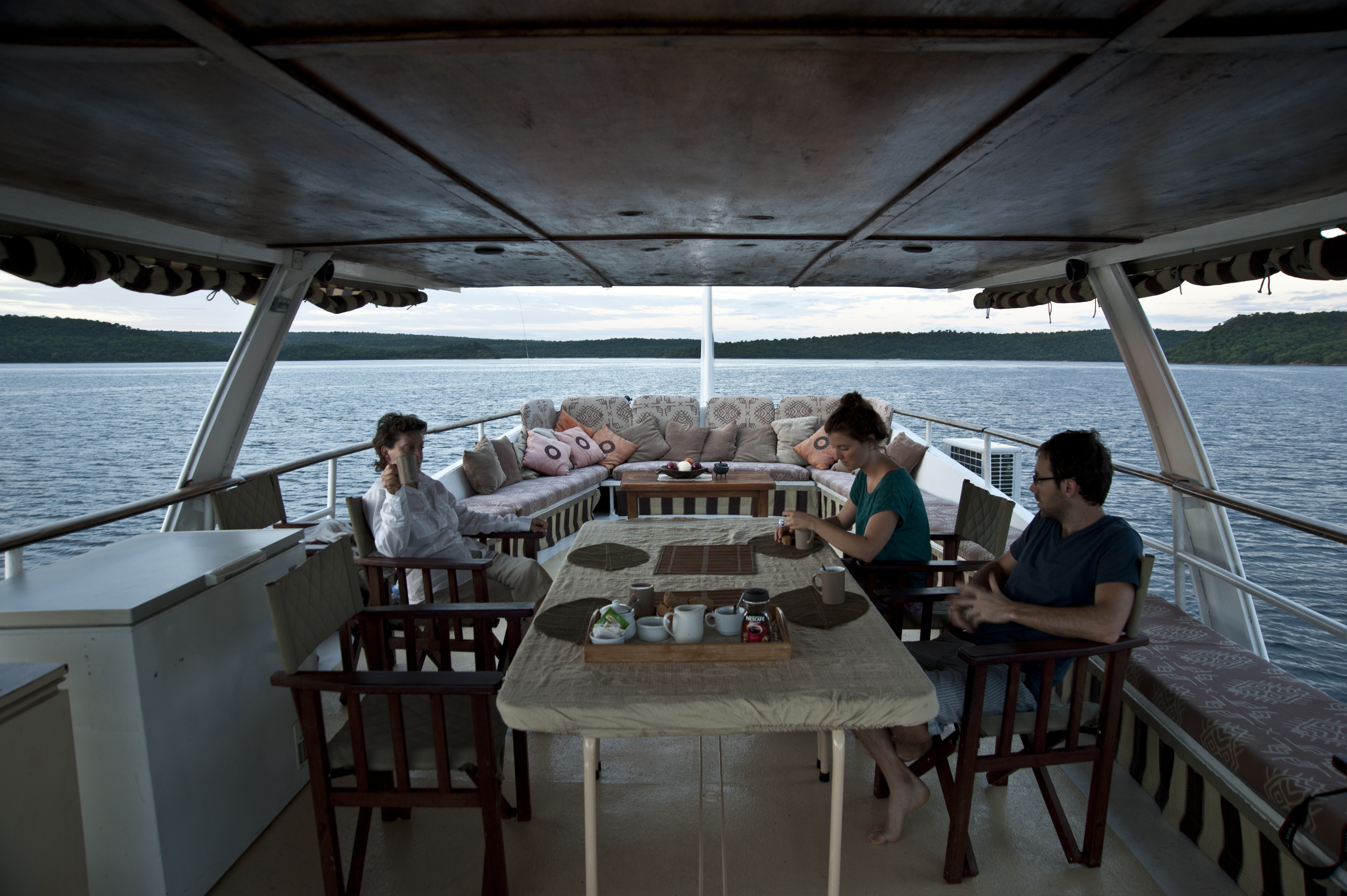
With its own master chef, meals on the Lady Jacqueline are worth waiting for. Image: Don Pinnock
As the sun heated the windless air, their largely aquatic life made good sense. I’d like to have emulated them, but the slide marks of crocs on a nearby sandbank suggested that remaining on board was the most prudent course of action.
By the time we reached Kariba we’d done more than 200 kilometres in 36 hours of travelling time at an average speed of around four knots. We tied up in Marineland Harbour among dozens of houseboats. That night, as a parting shot and in a blaze of almost continuous lightning and rolling thunder, the sky hurled down everything it could. Rain was blasting almost horizontally, hurling top deck cushions into the water and threatening to do the same with everything else not tied down. The shade awning ripped off, a nearby fuel pontoon broke its moorings and crashed into a nearby houseboat. Lady Jacqueline heaved and moaned as we watched in amazement through the lounge windows at nature’s spectacular show.
In the morning, as we said our farewells, the sky was innocent blue again and there wasn’t a breath of wind. That night, undoubtedly, the water would again reflect the Milky Way and a fish eagle would greet the dawn. Hippos would burp and bubble and Chauya would be tempting bream with a worm. But we’d be elsewhere. DM/ ML
Have the adventure
The owner of Lady Jacqueline has offered Maverick Life readers an exclusive adventure of a lifetime at half the standard rates. It includes return flights Johannesburg/Harare, self-drive 4×4 hire to get you to Lake Kariba, six nights on the boat full board with your own chef at R36,000 a person for two people. Extra adults are R9,740 each and children under 12 are R6,320. To book contact Maxine at [email protected] and give her the code FoaMav2021. For $600 a night you can hire the whole boat self-catering. It sleeps ten. Visit her here.


















A great trip is to combine land-based Matusadona camping on the lake and houseboat-based Kariba. 3 nights boat, 4 nights camping, 3 nights boat.
Careful walking among the black rhino and lion, both have taken tourists out.
Great memories, thank you!